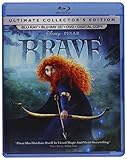
The princesses at the center of this story–sisters Elsa and Anna–are defined by their unique upbringing and estranged relationship to one another, not by the men in their lives. Without going into too many spoilers, let’s just say that Frozen‘s climax does not involve a man coming to the rescue of a starry-eyed princess.

Frozen directors Jennifer Lee and Chris Buck. Instead, it cleverly tweaks the formula, all the while acknowledging that it is a formula. Knowing the studio’s history, you could be forgiven for expecting Frozen to follow suit. Even Tangled, with its capable, headstrong version of Rapunzel, left the final heroic act to her leading man. And then that progress was undermined with the infamous slimmed-down, glammed-up redesign of Merida. At the same time the studio is promoting the resurgence of The Little Mermaid, with its archaic message of “change yourself for your man,” we also get a film like Brave, which actively avoids those tropes and features a princess who dreams of independence rather than the love of a prince. (I’ve personally tried to stem the tide of princess culture in our house, and I’m here to tell you it’s a constant struggle.) Disney’s response to the backlash has been mixed. The consumer product driven phenomenon is extremely popular and lucrative, yet its detractors are becoming increasingly vocal and demanding of better role models. It’s true that Disney has a princess dilemma. Anyone who supports the depiction of strong, independent women in the media, not to mention the positive representation of sororal bonds, ought to be championing it, not organizing a boycott. I believe this because Frozen may just be the most feminist animated film Disney has ever produced. Now that I have seen it, I believe it’s even more important to confront these accusations head on, because not only are they way off base, they distract from the film’s true message and may actually be detrimental to the promotion of feminism in Hollywood. I resisted the temptation to comment until now since I hadn’t yet seen the film, and though the early footage and previews seemed to discount these charges as wildly reactionary and having little to do with the actual product itself, I wanted to be sure I hadn’t been taken in by my own anticipation and the formidable powers of Disney’s PR machine. Their gripes range from a knee-jerk aversion to Disney’s princess culture in general to the liberties taken with the source material–Hans Christian Andersen’s The Snow Queen–to outrage when the studio’s animation supervisor was quoted as saying that animating female characters is hard because you have to make them “pretty.”

I’ve seen a lot of criticism from feminists in many corners of the web and social media leading up to the release of Frozen.


 0 kommentar(er)
0 kommentar(er)
